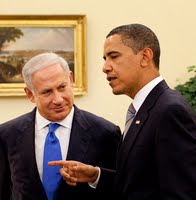JERUSALEM -- When the U.S. and Israel announced last week that they had decided to either cancel or postpone the biggest joint military exercise in their history, the news kicked the wheels of the Mideast rumor and speculation machines into high gear. After all, the missile defense maneuvers codenamed Austere Challenge 12 had been touted as a major event, designed to send a clear message to several key audiences -- including the Iranian government -- that Israel and the U.S. would work together to stop Iran's nuclear enrichment program. What had started as a determined show of military force and political coordination, however, suddenly turned into a muddled mess of mixed messages and confusion.
In the swirl of speculation about the real reason behind the change of plans for Austere Challenge, some suggested the confusion itself was part of an intentional strategy designed to throw off the Iranian side. But that theory sounds very much like wishful thinking. Regardless of what went on behind the scenes, the announcement of what now looks like a postponement rather than a cancellation was clearly a tactical bungling of the communications effort.
The scheduled missile defense drill didn't take place, but an unscheduled test of the two countries' joint public messaging capabilities did. It was a dismal failure.

